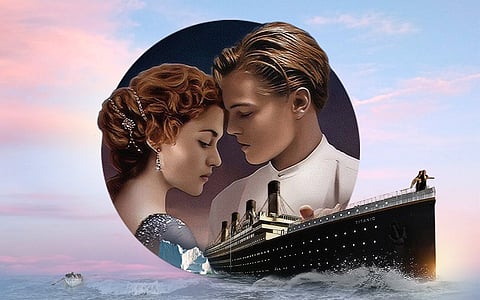
- Reviews
- Power List 2024
- Cannes 2024
- In-Depth Stories
- Web Stories
- News
- FC Lists
- Interviews
- Features
- FC SpecialsFC Specials

Titanic releases in cinemas once again today. To the world, Titanic is an epic, the highest grossing film ever for decades, the movie with the highest number of Oscars. For me, it is all of the above, and a beautiful part of my own coming of age.
It remains one of my favourite films of all time, for how it meant different things to me at different stages in my life. I would describe Titanic as an abstract painting, which I went back to look at every few years, by pure coincidence. Each time, it communicated something new to me. A new dimension in storytelling, the exploration of an emotion I hadn't felt before, a deeper study of character. This realisation held a mirror to my own self, like the painting smiling back at me and saying, 'look, you've grown up since the last time you were here.'
The first time I saw Titanic was at age 6, on my TV. My eyes went wide at the scale of the ship and its grandeur. They went equally wide at the shots of it drowning, the water overflowing inside, all the explosions. The visual themes in the movie penetrated the depths of my brain, but the emotional themes completely escaped my understanding. I saw the ship sinking, but I did not understand 'destruction'. I saw people dying, but I did not understand 'death'. At that age, Titanic was a visual treat. I still remember trying to explain to my friends the way the ship sank, the way water gushed into its rooms, all the angles and the monster speed. It was something I had never seen before, a magnanimous disaster, a phrase of which I could only acknowledge the first half.
At age 12, I watched the movie again. I was flipping through channels and happened to catch the movie just starting. This time around, the helplessness of the characters moments before death reached my consciousness. Some of them accepted their fate with absolute horror and some with silent resignation, and I could perceive both. I think I might have gotten the slightest clue of what it meant for a ship of that scale to sink, for 1500 people to die in one incident. It was also the time I found out it was a real event. The visual aspects took a back seat this time, as I tried to process the emotional heft this movie left me with.
The next time I saw Titanic was at 16, fresh out of school and eager to enjoy every moment of my free time before starting university. I was also flipping channels this time, something I seemed to do a lot; and stopped at this shot of Leonardo Dicaprio's eyes from behind a canvas. In the movie, this is a shot from Rose's recollection of Jack after finding his drawing of her. Those were the most beautiful pair of eyes I had ever seen. Something about them hit me different this time, rendering me incapable of switching the channel. This time when I watched Titanic, what I discovered – tucked away from the chaos onboard like treasure – was a love story. A love story so innocent yet so resilient, so short-lived yet so timeless. From finding a man beautiful to realizing beauty in itself is genderless, from witnessing age-old class segregation to cheering when love rose above that; Titanic gave me many of my movie-firsts. The love story itself may have been modelled after a trope – 'rich girl who lives a suffocated life meets poor boy who shows her freedom' – but it adds emotional realness and layers to the trope, making us root for the characters and even become their companion in heartbreak when the tragic farewell does come. It attempts to chronicle Rose's journey after the Titanic sank, giving us the feeling of having watched a person's life and not just a movie. I still remember when I went to sleep that day, I replayed the entire movie in my mind. Every shot, every frame; something I have not felt with many movies in my life.
The next time I fully watched Titanic was at probably 18 or 19, during my vacation from university. Discussions about 'representation of women in media' and 'female objectification and the male gaze', were making their way from the pages of think pieces to the everyday lives of young people. I was beginning to understand the presence of a systemic problem in movie sequences that made me uncomfortable. It was around this time that the portrayal of nudity in Titanic helped me navigate the thin line between eroticism and objectification. Nudity was used to express intimacy and vulnerability within the context of a scene that could have very easily turned distasteful and sleazy, but instead stands as a note-worthy example of portraying female nudity without resorting to objectification. While the line 'draw me like one of your French girls' has the potential to seem corny, it can be easily ignored in the good spirit of things this movie does right.
It surprises me when I think about all the things I learnt, while growing up watching Titanic; a movie that is truly as deep and wide as the ocean itself. It must be lauded for achieving the rare feat of being absolutely entertaining and emotionally gripping, on a universal level. As I said, Titanic is many things, but to me it will always be a movie that so gracefully unraveled itself to me over time, both as a simple love story and a sweeping epic, all to the tune of Celine Dion's 'My Heart Will Go On.'